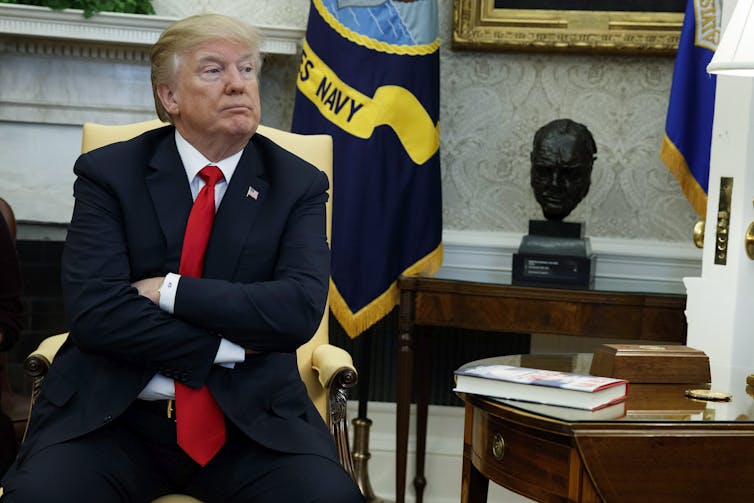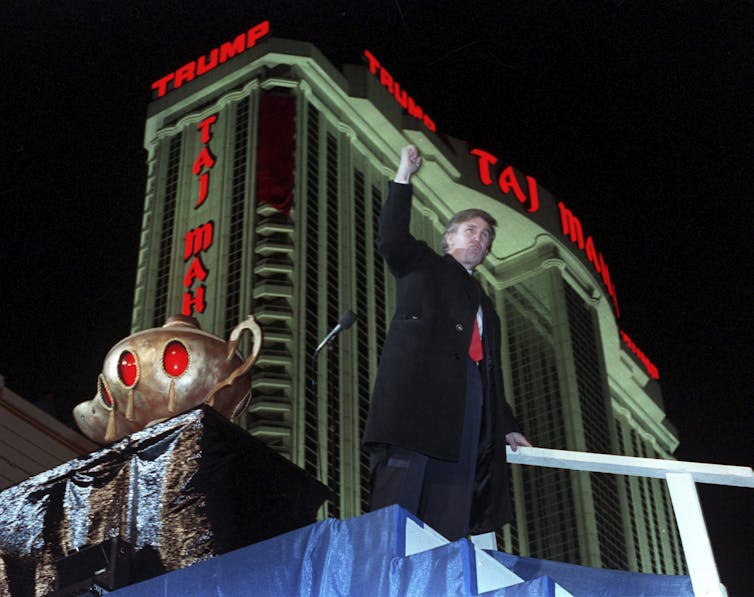This article was originally published on , which features includes relevant and informed articles, written by researchers and academics in their areas of expertise and edited by experienced journalists.
is an Associate Professor in International Development Studies at ╣¹¢┤╩ËãÁ.
On Jan. 31 this year, I shared a meal with , a North Korean defector turned activist, in the Canadian city of Halifax.
to share his horrific story of imprisonment and escape from a North Korean prison camp. That evening, as played on television, JungÔÇÖs phone was alight.
It was the White House calling.
Jung was invited, along with seven other North Korean defectors, to meet President Donald Trump on Feb. 2. The others included , praised by Trump in the State of the Union address, and , whose story became a New York Times bestseller.
As he met with the defectors, Trump said, in his inimitable vernacular, North Korea ÔÇ£.ÔÇØ The defectors told their stories of abuse, famine and torture, horrifying narratives that amounted to Orwellian nightmares. But Trump had little to say. He shrunk into that screamed of boredom.

Four months later on Sentosa (Peace) Island, formerly called Pulau Blakang Mati (Death From Behind), , North KoreaÔÇÖs despotic leader.
Trump smiled at Kim, shook his hand with enthusiasm, patted him on his back, and fawned over him with compliments, concerned with . He showed Kim an , produced with the air of a low-rent public safety video, selling Kim on the benefits of a nuclear-free Korean peninsula.
Dreaming of building hotels?
After an in-camera meeting, the pair resurfaced, supposedly confident that North KoreaÔÇÖs nuclear program would be a thing of the past. Trump even said how great it would be to build hotels on . But not once did he mention human rights abuses.
Some North Korean defectors . Others were devastated that the president went as far as saluting a of a military accused of bone-crushing torture and public executions.
How could someone invite victims of abuse to their home, and later praise their abusers?
The answer lies in the hyper-narcissism that Trump exudes, a dangerous mental disorder that is now shaping U.S. global relations. It can be best described as ÔÇ£Casino Diplomacy.ÔÇØ
According to , author of Fire and Fury, when Trump took a billionaire and a fashion model on a tour of his Atlantic City casino, the billionaire ÔÇ£assured the model that there was nothing to recommend in Atlantic City. It was overrun by white trash.ÔÇØ

The model asked what ÔÇ£white trashÔÇØ meant. Trump purportedly replied: ÔÇ£TheyÔÇÖre people just like me, only theyÔÇÖre poor.ÔÇØ This may be quite revealing.
Diplomacy as a game of blackjack
Any punter in a casino knows that the odds are against him. The house always wins. Yet gamblers continue into the labyrinth, at risk of losing it all, but confident that they still have a chance to win it all.
Problem gamblers, those suffering from , can exhibit various psychological mechanisms, in particular narcissism and impulsiveness, despite harmful consequences.
This is Trump. He is unmoved by high risks and wild odds through a feeling that his sheer cunning will always win, including, now, in the geopolitical sphere ÔÇö his latest casino.
Trump views opponents like a game of blackjack. Charm the dealer, like Kim, make strong bets like denuclearization, push them as close to a 21 as possible, and hope they bust.
For AmericaÔÇÖs allies, itÔÇÖs a crapshoot. And Trump holds the dice. Many people have interests on the table, the odds are high, from four per cent NATO commitments to tariff wars; Trump just rolls the dice. If it all comes up snake eyes? He rolls again.
, forget the emotional trust of North Korean defectors, forget it all. Go until the house folds.
ÔÇÿHapless punterÔÇÖ
Difficult as it is to predict the long-term consequences of TrumpÔÇÖs bellicose personality on global stability, be it with NATO or Russia or North Korea, his beloved game of Casino Diplomacy provides insight.
Much like a problem gambler, Trump engages the world stage through narcissistic risk-taking. His opponents understand this. What then can American allies do to mitigate this harmful behaviour?
Problem gamblers often benefit through support that builds confidence for the capacity to change. Is this possible for Trump, or is it simply too late?
Donald Trump is a hapless punter in over his head, putting all of his chips on the table hoping that the dealer busts. As with any problem gambler, heÔÇÖs creating a wealth of harm, but on a global stage ÔÇöfrom robbing the trust of North Korean defectors to destabilizing the global economy.
![]() TrumpÔÇÖs Casino Diplomacy, therefore, is no game. ItÔÇÖs a serious illness that will continue to profoundly harm people and nations around the world.
TrumpÔÇÖs Casino Diplomacy, therefore, is no game. ItÔÇÖs a serious illness that will continue to profoundly harm people and nations around the world.
Read the on The Conversation.
╣¹¢┤╩ËãÁ
University is a founding partner of The Conversation Canada, a
new-to-Canada online media outlet providing independent, high-quality
explanatory journalism. Originally established in Australia in 2011, it
has had more than 85 commissioning editors and 30,000-plus academics
register as contributors. A full list of articles written by ╣¹¢┤╩ËãÁ
academics can be found on .

